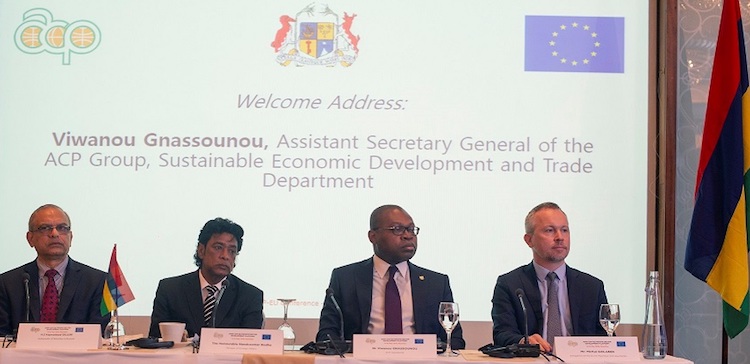By Reinhard Jacobsen
BRUSSELS (ACP-IDN) – The Secretariat of the African, Caribbean and Pacific (ACP) Group of States, has launched a series of regional meetings aimed at boosting ACP private sector information, developing knowledge sharing and networking.
As an integral activity of the Joint ACP-EU Private Sector Development Framework, these events are being organised with technical support from Business ACP – the ACP Private Sector Development Platform in close concertation with the European Commission.
This is particularly important at this point in time, as several new intra-ACP projects and substantial private sector financing facilities are being launched or expanded, under the 11th European Development Fund (EDF) and the European External Investment Plan (EIP). Mauritius hosted the first information and knowledge sharing workshop from May 14 to 16, 2019.
The main objectives were:
– to provide targeted ACP stakeholders, intermediary organisations and selected private sector beneficiaries with comprehensive information on relevant intra-ACP programmes, the EIP, European Investment Bank-managed and other European Commission-related Private Sector Development facilities and programmes targeting the ACP regions;
– to provide a platform for peer-to-peer learning and experience sharing in the area of Private Sector Development;
– to ensure a high degree of interaction among ACP private sector participants, and with project implementation agencies as well as EU stakeholders, in the form of networking in the areas of finance, trade, know-how and technology transfer.
Explaining the importance of the event, Assistant Secretary General of the ACP Group, Department of Sustainable Economic Development and Trade, Viwanou Gnassounou, said: “No one can really tell us what is good for our growth and development. For this to happen, we need the ingenuity of our peoples, strongly rooted in African culture, building on history and carrying the dream and hope of a nation.”
He added: “This is what Mauritius has demonstrated. Of course, the private sector should not be left alone with all the virtues. The strategy adopted to support private sector development is to maintain a dialogue between public decision-makers and private economic actors so that the instruments developed are really useful to support wealth creation and development in our countries.”
This regional event was structured in three parts: the first day was devoted to providing detailed information on how the private sector can benefit from intra-ACP/EDF and EU financing facilities as well as Private Sector Development programmes.
Five thematic knowledge-sharing sessions allowed participants to learn from peers and experts and discuss the opportunities and challenges of African development in such fundamental areas as business environment reform and investment promotion, digital entrepreneurship development, digital start-up financing models, African industrial transformation, renewable energy and industry 4.0.
“Public resources are never sufficient to fully implement the sustainable development objectives. That is why we need the support of the private sector. We are also exploring new ways to engage the private sector in engaging and contributing to the achievement of these objectives,” said Michal Golabek, Chargé d’affaires, Delegation of the European Union to Mauritius and the Republic of Seychelles.
The Minister of Public Infrastructure and Transport and Minister of Foreign Affairs, Regional Integration and International Trade in Mauritius, Nandcoomar Bodha, who attended the protocol ceremony, made it clear: “We have always wanted the private sector in Mauritius to spearhead economic activities and the state to play a facilitating role. That this conference took place in Mauritius is extremely positive for the country.”
The interface used to be between the European Union and the States, he added, and it is a very good initiative that this synergy is now being achieved at the level of the European institutions and operators in the field. In the future, the European Union could, through new agreements, set up programmes to facilitate market access or even access to investment and thus enable the private sector to play its full role in the development of ACP countries.
In addition to ACP countries, the EU and regional organisations (SADC and COMESA), the main advantage of the event was that it brought together private sector actors (investment, trade/export, SMEs/SMIs, SME/SMI incubators/accelerators, investment climate reform, technological and industrial development, SME financing, etc.) from the East and Southern African regions, who, over three days, could exchange experiences and know-how and engage in a constructive dialogue to find solutions to the challenges facing their countries.
Private sector actors were thus able to compare their visions and propose possible solutions and ideas to the international organisations also present as well as to intra-ACP and European Union facilitators and programmes. [IDN-InDepthNews – 23 May 2019]
Photo: (from left to right) Haymadoyal Dillum, Ambassador of Mauritius to Brussels; Nandcoomar Bodha, Minister of Public Infrastructure and Transport and Foreign Affairs, Regional Integration and International Trade; Viwanou Gnassounou, Assistant Secretary General of the ACP Group, Department of Sustainable Economic Development and Trade and Michal Golabek, Chargé d’affaires, European Union Delegation in Mauritius and Seychelles.
This report is part of a joint project of the Secretariat of the ACP Group of States and IDN, flagship agency of the International Press Syndicate.
facebook.com/IDN.GoingDeeper — twitter.com/InDepthNews — twitter.com/acp_idn
Send your comment: comment@indepthnews.colo.ba.be
Subscribe to IDN Newsletter: newsletter@indepthnews.colo.ba.be

